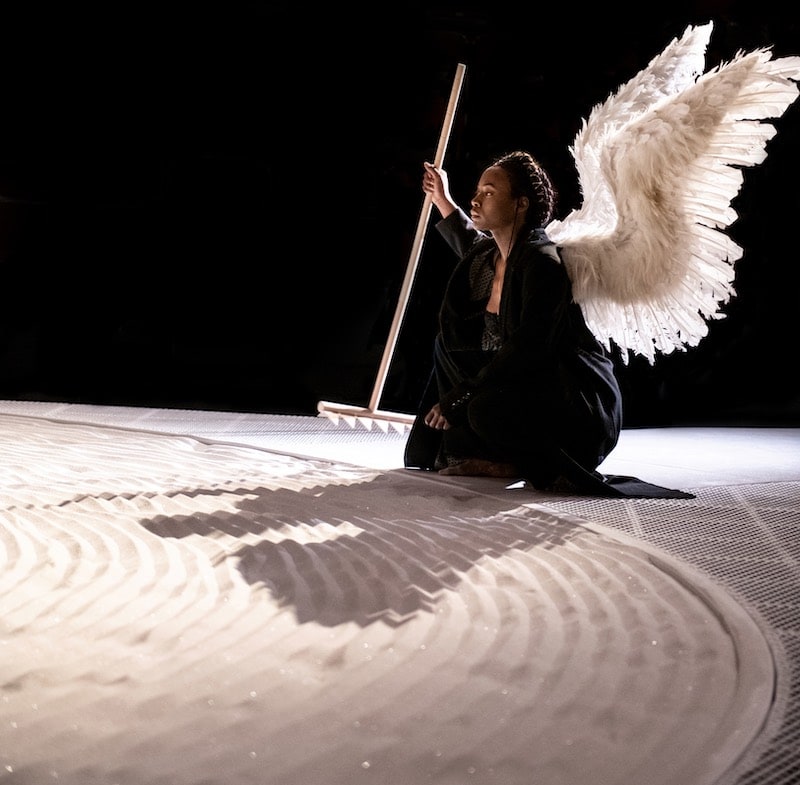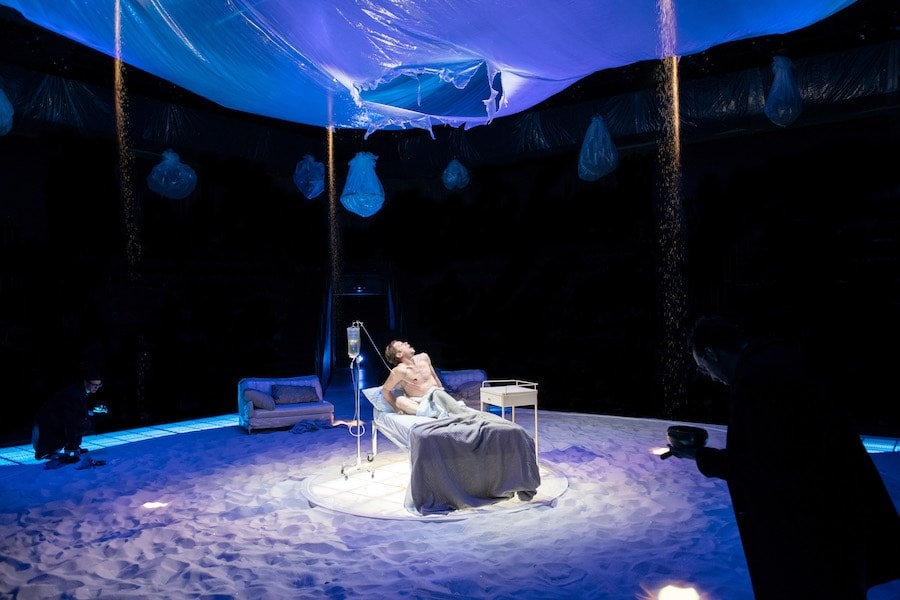Angels in America burst onto the theatrical scene and into national consciousness at The Public Theater in 1991 and, two years later, moved to Broadway. The play was an indictment of America’s cruel abandonment of those of its citizens who were affected by the disease AIDS.
Written by one Jewish man (Tony Kushner) and directed by another (János Szász), Arena Stage’s production of the play is concerned with the process of wrestling with what is often called God and how choosing to engage in that wrestling or trying to avoid it affects our covenant with our fellow human beings.
This production of Angels in America, Part One: Millennium Approaches is a mind-boggling and breathtaking panoramic spectacle, part circus and part nightmare. With its sumptuous costuming (Oana Botez), ritual-inviting set design (Maruti Evans), and multi-layered staging, it is by turns disorienting, devastating, and exhilarating.

For those of us who lived through the era of AIDS before there were effective treatments for the disease, the disorientation begins before we enter the theater. In the lobby were panels from the AIDS Memorial Quilt on display. And in the men’s room, I heard “That’s What Friends Are For” playing over the speaker. This version recorded by Dionne Warwick, Elton John, Gladys Knight, and Stevie Wonder became an anthem proclaiming solidarity, compassion, and comfort in a time when those things were lacking for people affected by or living with HIV.
Once in the theater, before the lights went down, names of those dead from AIDS could be heard being read through the sound system. In the 1980s and 1990s, when this would happen in our lives on a regular basis, I remember often being surrounded by people crying or in a deeply held silence. In the theater in 2023, this recital of names became background to the audience settling down to experience art. In the 30 years since the show’s Broadway opening the suffering and survival of those who lived it has become a historical artifact. What does that mean? And how does one live with that?
This is not a criticism of this production. It’s a description of the process of one person’s entry into the world of the play. The facilitation of these shifts of attention in preparation for watching this play is one of the many subtle and effective ways in which director János Szász brings the play into conversation with the audience.
The most disorienting moment in the evening came when one of the characters — the eager young conservative lawyer Martin Heller (Deborah Ann Woll) — says these words:
By the ’90s the Supreme Court will be block-solid Republican appointees. And the federal bench: Republican judges like landmines. Everywhere, everywhere they turn. Affirmative action? Take ‘em to court. Boom! Landmine. We get our way on everything. Abortion. Defense. Central America. Family values… It’s really the end of liberalism. The end of New Deal socialism. The end of ipso facto secular humanism. The dawning of a genuinely American political personality modeled on Ronald Wilson Reagan.
It was clear from the audience’s reaction that we couldn’t believe what we were hearing. Regardless of whether you had lived through the HIV pandemic or “only” COVID, suddenly we were all on the same page.
Some things that audience members may have been thinking: 1) Isn’t this a story about the historic devastation of HIV/AIDS and the ongoing injustice of gay oppression? Or, maybe: 2) If the current state of our country was so clearly articulated in 1993 from a Broadway stage, how did we nevertheless allow ourselves to get here? How could we not hear what had been so clearly predicted? And in an ultimate summation of how shocking and disorienting these words were, a colleague of mine suggested that these words might be a recent addition to the text. (They are not.)
In Angels in America, playwright Tony Kushner asks us to take seriously the prophet Joel when he says:
“And it shall come to pass afterward that I will pour out My spirit upon all flesh; and your sons and your daughters shall prophesy; your old men shall dream dreams and your young men shall see visions. Even on my servants, both men and women, I will pour out my Spirit in those days.” —Joel 2:28-29.

The play takes place in 1985 and 1986 and, as if emphasizing exactly how lowly and unlikely the people are whom God chooses to be prophets, we are presented with two characters in two parallel relationships that are coming apart, Prior Walter (Nick Westrate) and Harper Pitt (Deborah Ann Woll). Prior is a gay man who, after being recently diagnosed with Kaposi sarcoma, an AIDS-defining illness, has been abandoned by his lover, Louis. Harper — whose husband, the secretive Joe Pitt, does not celebrate her body nor share his body with her — is wracked with fear and insecurity and addicted to Valium. It is through Harper’s and Prior’s intersecting visions and hallucinations that the play unfolds, introducing us to people as disparate as Ethel Rosenberg (Susan Rome), a Jewish activist whose husband was convicted of treason and who, despite being a mother, was executed for treason; Roy Cohn, (Edward Gero) the Jewish attorney who pushed for Ethel to be executed; and Belize (Justin Weaks), the drag name of an African-heritage friend to Prior and nurse to Roy Cohn.
Hungarian director János Szász brings his non-American sensitivities to bear with our first viewing of the set. Set designer Maruti Evans has covered the stage in sand — six inches deep — with a huge circular pit in the center that would ascend or descend at various points in the show.

Suspended over this pit are electric candelabras wrapped in tattered translucent plastic. The image suggests several things: a formerly grand but now neglected property (Ms. Haversham’s in Great Expectations) or a place that is being sold at auction for repayment of debts. On the other hand, given the context of the play, all this tattered plastic wrap could be seen as condoms that had broken.
At first one might wonder what all this sand was for. But a very renaissance Angel (albeit of African heritage) walks around the circular space, trailing a rake behind her, scoring the surface of the sand with lines that encircle the pit as she goes. Soon the space becomes like a zen garden as members of the cast enter with Tibetan brass singing bowls. This disorienting/reorienting set-up immediately reframed the proceedings in an atmosphere that served as a counterweight to the Judaism/Christianity vortex in which most of us in the U.S.A. and the play’s characters function.
Doubling down on the Asian references and underscoring the play’s emphasis on time, sand (as in an hourglass) rains down from holes in an overhead plastic sheet at various times during the play.
Szász overlaps many scenes that would usually have been separated by set changes. This made it possible for the scenes to talk to each other and allowed the characters to experience a kind of internal unconscious awareness of, influence over, and connection to each other. This staging suggests that the processes that Prior and Harper are going through are the same. It suggests that the source of the most harrowing suffering that we see Prior and Harper experience is not exclusive to their gender or sexual orientation or religion or lack thereof. Rather it seems to be most connected to the fact that the people with whom they are in a covenantal relationship have not honored the covenants they made.
Prior’s Angel (Billie Krishawn) used American Sign Language to supplement her communication. This lent a feeling that there was always something more that was being said than what we can hear with our ears.
Oana Botez took the opportunity to engage the audience’s imagination with her costuming. Two provocative pieces were the mischievous yellow suit of Mr. Lies, the tallit (a fringed prayer shawl that religious Jewish males wear) that was perhaps 14 feet long and trailed on the sand behind the female Rabbi as she spoke, and the medieval beaked plague masks connecting the 20th-century epidemic to the older one.
Everyone in this cast plays multiple characters and everyone is working at the top of their game. Every performer demonstrates spontaneity within their monologs and in dialog with others. It’s a credit to a director who can pull from everyone in the cast such consistently high levels of un-selfconscious performance. If you have seen some of these performers before, you may observe variations in their performance palette that you have not experienced before.
Scenes that were particularly effective and evocative include the exchange between Louis (Michael Kevin Darnall) and Belize in which Belize, Prior Walter’s ex-lover, plants grave markers in the sand using crosses and stars of David while Louis spouts anti-Black and anti-drag-queen assumptions. It was as if there was a taut connective cord between the two of them that they both held onto for dear life.
Justin Weaks as Mr. Lies was full of blues. As Belize, he was full of Caribbean pride that don’t take no mess. Edward Gero’s Roy Cohn was crass American venality at its most annoyingly disgusting and horrifying.
Szász sharpened the play’s focus on the betrayal of covenant as destructive not only for the individuals involved but for society as a whole. One of the play’s lines struck me as hard because it was something I didn’t want to hear. In the midst of a political rant by Louis, Belize responds: “Justice is simple. Democracy is simple. But love is very hard. And it goes bad for you if you violate the hard law of love.”
Running Time: Three hours and 30 minutes with a 15-minute intermission.
Angels in America, Part One: Millennium Approaches plays through April 23, 2023, in the Fichandler Stage at Arena Stage, 1101 Sixth Street SW, Washington, DC. Tickets ($56–$95) may be purchased online, by phone at 202-488-3300 (Tuesday–Sunday, 12:00-8:00 p.m.), or in person at the Sales Office at 1101 Sixth Street SW, Washington, DC (Tuesday–Sunday, 12:00-8:00 p.m.). Arena Stage offers savings programs including “pay your age” tickets for those aged 30 and under, student discounts, and “Southwest Nights” for those living and working in the District’s Southwest neighborhood. To learn more, visit arenastage.org/savings-programs.
The playbill for Angels in America is online here.
Closed captions are available via the GalaPro app.
COVID Safety: Arena Stage requires that patrons wear facial masks while in its theaters. Arena additionally recommends, but no longer requires, that patrons wear masks in the Mead Center’s large open spaces, such as the Lower Lobby, Grand Lobby, Molly Smith Study, and café area. For up-to-date information, visit arenastage.org/safety.
Angels in America, Part One: Millennium Approaches
By Tony Kushner
Directed by János Szász
CAST
Joe Pitt/Prior I Eskimo: John Austin
u/s Roy Cohn/Belize: Frank Britton
Louis Ironson: Michael Kevin Darnall
u/s Hanna Pitt/Harper Pitt/The Angel: Veronica del Cerro
Roy Cohn/Prior II: Edward Gero
u/s Joe Pitt/Louis Ironson/Prior Walter: Brandon Haagenson
The Angel/Emily/Sister Ella/Homeless Woman: Billie Krishawn
Hanna Pitt/Rabbi Henry/Ethel Rosenberg: Susan Rome
Belize/Mr. Lies: Justin Weaks
Prior Walter/Man in Park: Nick Westrate
Harper Pitt/Martin Heller: Deborah Ann Woll
CREW AND CREATIVE TEAM
Director: János Szász
Set Designer: Maruti Evans
Costume Designer: Oana Botez
Lighting Designer: Christopher Akerlind
Original Music and Sound Designers: Fabian Obispo
Wig and Makeup Designer: The Wig Associates
Dramaturg: Otis Ramsey-Zöe, Zöe Elizabeth Lillis
Stage Manager: Chris De Camillis
Assistant Stage Manager: Dayne Sundman, Leigh Robinette
Movement Coach: Joseph Pinzon
Voice and Dialect Coach: Zach Champion
Assistant Costume Designer: Calab Krieg
COVID-19 Compliance Officer: Trevor Comeau
Stage Carpenters: Hannah Martin, Sarah Schlehlein
Props: Erika Feidelseit, Alekx Shines
Light Board Operator: Kelsey Swanson
Lighting Assistant: Hayley Garcia Parnell
Audio Engineer: Lex Allenbaugh
Wardrobe Supervisor: Alice Hawfield
Wardrobe: Grace Fitzpatrick, Eli Kern, Lillian Komarow, Sinclair Alexicion Shines
Wigs, Hair, and Makeup Supervisor: Jaime Bagley




